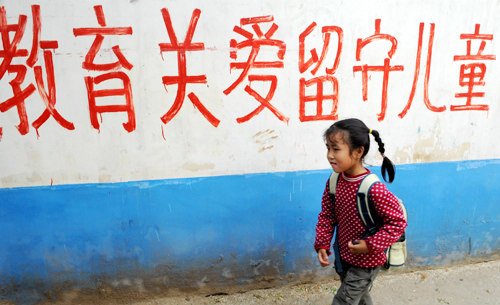|
 |
|
BACK HOME ALONE: A girl passes by a wall slogan reading "Left-behind Children Are Priority of Education" in Handian Village, Luohe, Henan Province, on October 20, 2008 (ZHU XIANG) |
Li Xingjun, the headmaster of Chen's primary school, said the time many village children spend apart from their parents leaves a heavy burden on local schools.
"For example, when we teach students to love their family and parents, they ask why their parents don't love them," said Li, who revealed that 80 percent of the students in the school only see their parents once a year.
"These children become introverted and more aggressive. They don't want to study and since their parents aren't around, it's hard to control them. They sometimes even fight with the teachers," Li said.
Compared to the children in Qingshui, Chang Jian seems lucky. He was able to accompany his parents from Anhui Province to Beijing. Living in a flat outside of Beijing's North Fifth Ring Road, Chang's parents sell vegetables and Chang attends a school for migrant workers nearby.
"We brought him from our hometown in 2009 as his grandparents all passed away and there was no one to look after him at home," said Chang's father.
But it was so hard to find a school for him in Beijing that Chang spent his first year in the city following his parents as they sold vegetables. Now, Chang is 10 years old but only in the first grade of primary school.
Chang's parents are happy that they have finally found a school for their son, but Chang is still not happy with city life.
"I have no friends here," he said. "I haven't been to the Summer Palace, Tiananmen Square and other tourist attractions. I don't even know what they look like."
Chang's sense of isolation and not belonging is common among children of migrant workers who are living in cities. Rejected by public schools due to restrictions of China's rigid residence registration (hukou) system, migrant children must attend private schools for migrant workers' children. These schools typically don't offer a high standard of education and frequently close down as a result of financial difficulties.
When the schools close down, students are forced to drop out and some are eventually sent back to their hometowns.
"Every time a new semester starts, we notice a lot of familiar faces are missing," said Yan Zhaoshi, founder of a school for migrant workers' children in Beijing. "Some leave because the parents really cannot afford the education, some just return with their families to their hometowns. We try our best to keep students here."
Zhao Minqing, a college student at Tsinghua University, is a regular volunteer at a Beijing-based school for migrant workers' children founded by a charity organization called Compassion for Migrant Children.
"Most of the children at first are very shy and don't want to talk to teachers at all," Zhao said. "We once held a party that allowed these children to meet students from public schools, but they didn't seem to have much in common."
"It is a pity because many of the children here are gifted and clever," Zhao said. "But they can't get a normal education. It's a waste."
Statistics from the Ministry of Civil Affairs showed that the number of migrant workers in China had reached 242 million at the end of 2010. These migrants left 58 million children in their rural hometowns, while approximately 50 million children followed their parents to cities.
"Most of these children feel at a loss as to where their home is," said Wang Xiaozhang, a sociology professor at Zhejiang University. "The social stigma attached to migrant workers may explain the loneliness and isolation felt by their children."
Wu Guangyi, a construction worker in Beijing from central China's Henan Province, always asks his son to spend his summer vacations in Beijing, believing it will broaden his vision and allow him to learn new things.
"My son is active and talkative at home," Zhang said. "But every time he comes to Beijing, he becomes very silent. I don't know what I can do to change that."
"The intense feelings of social rejection that migrant workers experience work to lower their children's self-esteem," Wang said. "They fail to adapt to city life, as the bias and prejudice they find are hard for them to overcome."
"Migration has changed the traditional definition of home in China," said Zhang Yulin, a professor at Nanjing University in Jiangsu Province. "About 70 percent of rural families do not live together under one roof. The separation and displacement that the children of these broken rural families encounter set back their development, preventing a whole generation from reaching its true potential.
Email us at: yuanyuan@bjreview.com | 